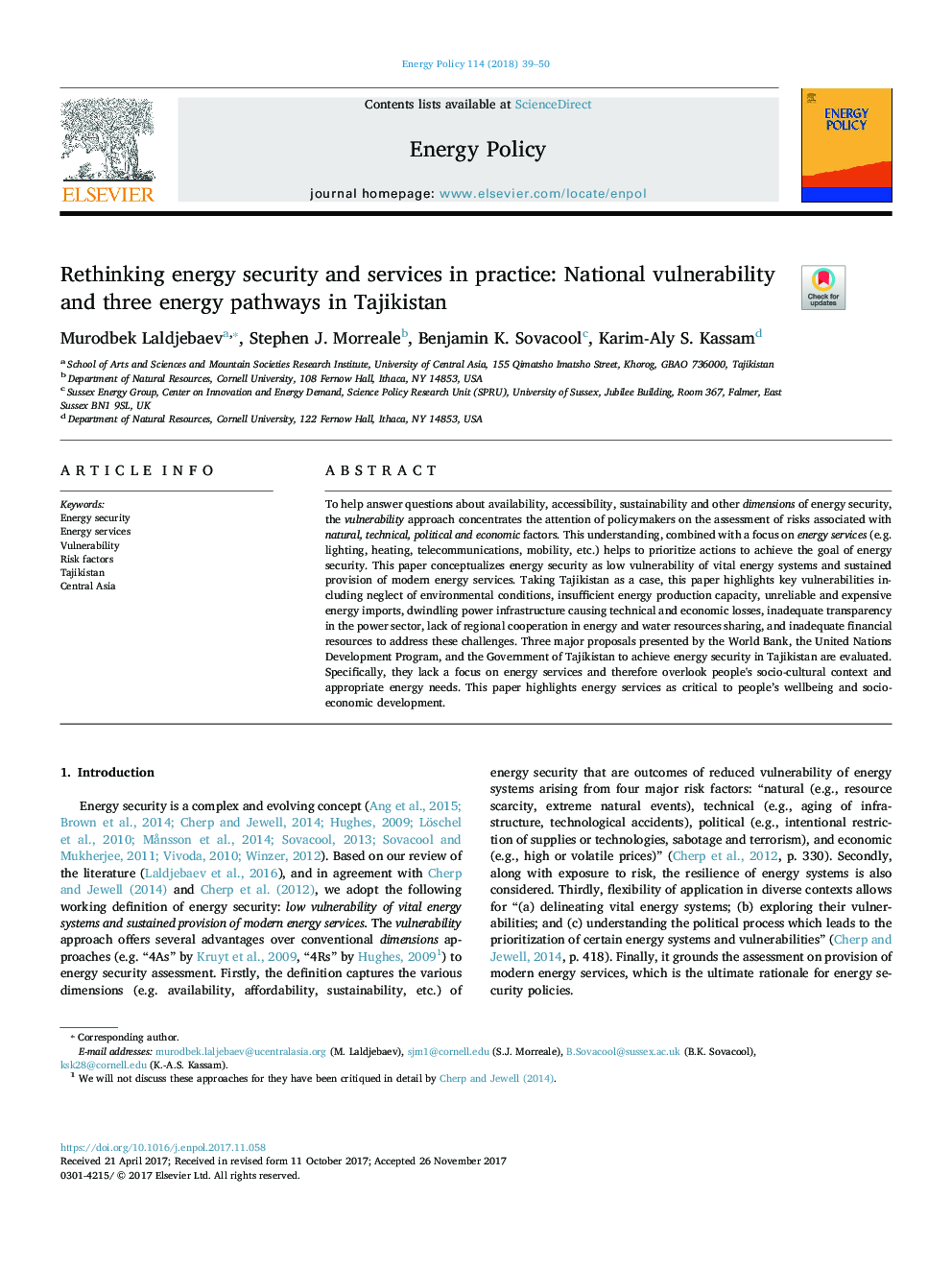| کد مقاله | کد نشریه | سال انتشار | مقاله انگلیسی | نسخه تمام متن |
|---|---|---|---|---|
| 7397619 | 1481244 | 2018 | 12 صفحه PDF | دانلود رایگان |
عنوان انگلیسی مقاله ISI
Rethinking energy security and services in practice: National vulnerability and three energy pathways in Tajikistan
ترجمه فارسی عنوان
بازنگری امنیت انرژی و خدمات در عمل: آسیب پذیری ملی و سه مسیر انرژی در تاجیکستان
دانلود مقاله + سفارش ترجمه
دانلود مقاله ISI انگلیسی
رایگان برای ایرانیان
کلمات کلیدی
امنیت انرژی، خدمات انرژی، آسیب پذیری، عوامل خطر، تاجیکستان، آسیای مرکزی،
ترجمه چکیده
برای کمک به پاسخ به سوالات در مورد قابلیت دسترسی، قابلیت دسترسی، پایداری و سایر ابعاد امنیت انرژی، رویکرد آسیب پذیری توجه سیاستگذاران را در ارزیابی خطرات مرتبط با عوامل طبیعی، فنی، سیاسی و اقتصادی متمرکز می کند. این درک، همراه با تمرکز بر خدمات انرژی (به عنوان مثال نورپردازی، گرمایش، ارتباطات راه دور، تحرک و غیره) کمک می کند تا اولویت بندی اقدامات برای دستیابی به هدف امنیت انرژی باشد. این مقاله امنیت انرژی را به عنوان آسیب پذیری کم سیستم های حیاتی انرژی و تامین مداوم خدمات انرژی مدرن مفهوم می کند. با توجه به تاجیکستان در این مقاله، این مقاله آسیب پذیری های اصلی را شامل عدم توجه به شرایط محیطی، ظرفیت تولید انرژی نامناسب، واردات غیر قابل اعتماد و گران قیمت انرژی، کاهش زیرساخت های برق باعث زیان های فنی و اقتصادی، عدم شفافیت در بخش برق، عدم همکاری منطقه ای در انرژی و به اشتراک گذاری منابع آب و منابع مالی نامناسب برای مقابله با این چالش ها. سه پیشنهاد عمده ارائه شده توسط بانک جهانی، برنامه توسعه سازمان ملل و دولت تاجیکستان برای دستیابی به امنیت انرژی در تاجیکستان ارزیابی می شود. به طور خاص، آنها فاقد تمرکز بر خدمات انرژی نیستند و بنابراین زمینه اجتماعی و فرهنگی مردم و نیازهای انرژی مناسب را نادیده می گیرند. این مقاله خدمات انرژی را به عنوان حیاتی برای سلامتی مردم و توسعه اجتماعی و اقتصادی برجسته می کند.
موضوعات مرتبط
مهندسی و علوم پایه
مهندسی انرژی
مهندسی انرژی و فناوری های برق
چکیده انگلیسی
To help answer questions about availability, accessibility, sustainability and other dimensions of energy security, the vulnerability approach concentrates the attention of policymakers on the assessment of risks associated with natural, technical, political and economic factors. This understanding, combined with a focus on energy services (e.g. lighting, heating, telecommunications, mobility, etc.) helps to prioritize actions to achieve the goal of energy security. This paper conceptualizes energy security as low vulnerability of vital energy systems and sustained provision of modern energy services. Taking Tajikistan as a case, this paper highlights key vulnerabilities including neglect of environmental conditions, insufficient energy production capacity, unreliable and expensive energy imports, dwindling power infrastructure causing technical and economic losses, inadequate transparency in the power sector, lack of regional cooperation in energy and water resources sharing, and inadequate financial resources to address these challenges. Three major proposals presented by the World Bank, the United Nations Development Program, and the Government of Tajikistan to achieve energy security in Tajikistan are evaluated. Specifically, they lack a focus on energy services and therefore overlook people's socio-cultural context and appropriate energy needs. This paper highlights energy services as critical to people's wellbeing and socio-economic development.
ناشر
Database: Elsevier - ScienceDirect (ساینس دایرکت)
Journal: Energy Policy - Volume 114, March 2018, Pages 39-50
Journal: Energy Policy - Volume 114, March 2018, Pages 39-50
نویسندگان
Murodbek Laldjebaev, Stephen J. Morreale, Benjamin K. Sovacool, Karim-Aly S. Kassam,
